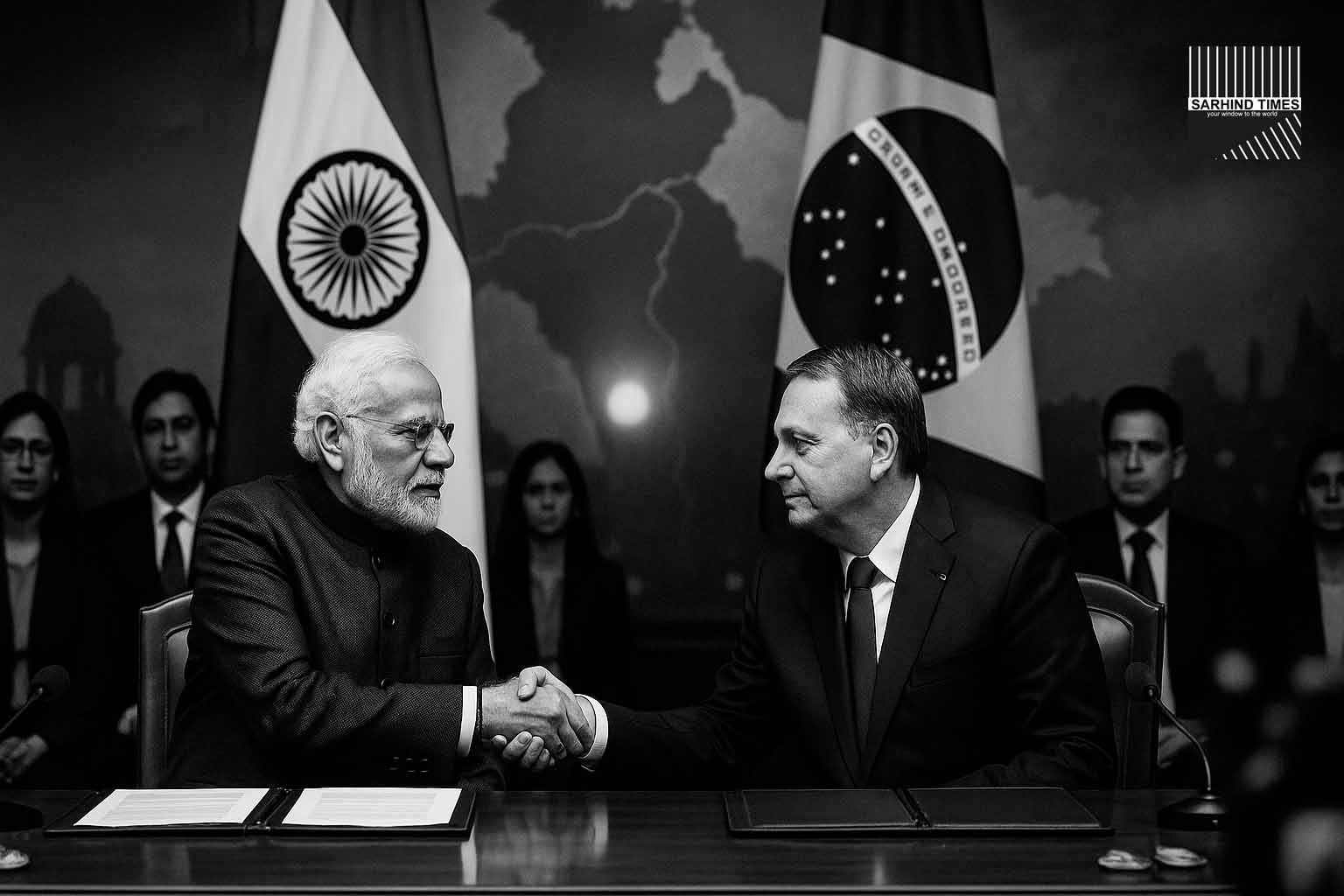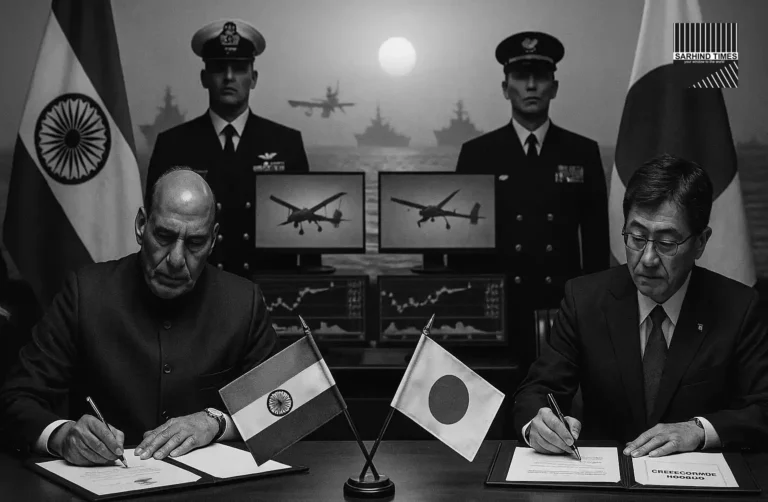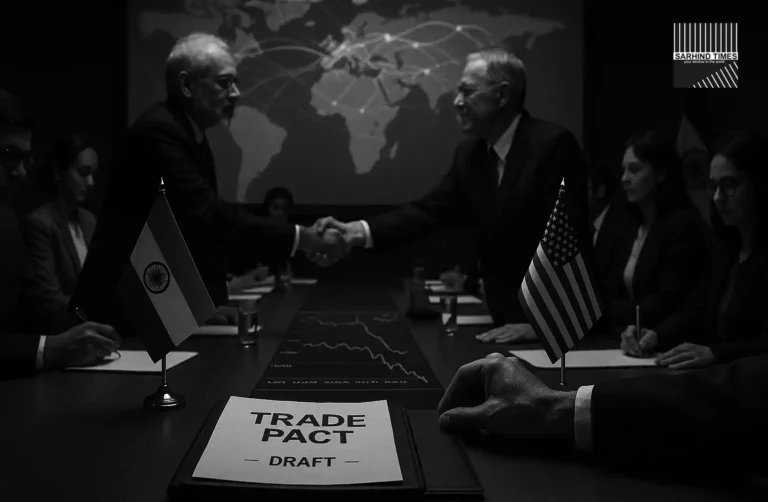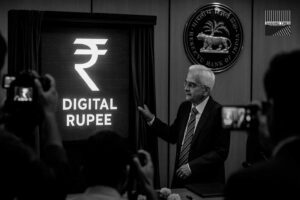By SarhindTimes International Bureau | New Delhi / Brasília | Tuesday, October 21, 2025
As global economies recalibrate amid geopolitical flux, India and Brazil are charting a new strategic course in their bilateral partnership. The two emerging giants—linked through BRICS, shared democratic values, and complementary economies—are deepening cooperation in pharmaceuticals, defence manufacturing, and agri-technology under a new trade and innovation framework signed in New Delhi this week.
Officials describe the talks as “the most comprehensive India–Brazil economic dialogue since 2019.” The blueprint aims to double bilateral trade to $30 billion by 2030, focusing on supply-chain diversification, joint research, and technology transfers.
Backdrop: A Partnership of Equals
India and Brazil established diplomatic relations in 1948, but the partnership gained momentum in the 21st century through forums like IBSA (India–Brazil–South Africa Dialogue) and BRICS.
While both nations share common aspirations in global governance—pushing for UN Security Council reform and South–South cooperation—trade had remained modest due to logistical and tariff barriers.
Now, as both economies seek autonomy from overdependence on traditional Western markets, the New India–Brazil Strategic Trade Dialogue (NBSTD) is designed to unlock untapped potential across pharma, defence, agriculture, clean energy, and digital innovation.
Key Outcomes of the 2025 Talks
The three-day high-level dialogue, co-chaired by India’s Commerce Minister Piyush Goyal and Brazil’s Minister of Development, Industry and Foreign Trade Geraldo Alckmin, concluded on Monday with several Memoranda of Understanding (MoUs):
- Pharmaceutical Cooperation Framework – enabling joint production of vaccines, APIs (Active Pharmaceutical Ingredients), and generic drugs.
- Defence Technology Partnership – facilitating co-development of radar systems, drones, and naval components under India’s Make in India and Brazil’s Defesa Nacional 2030 strategies.
- Agri-Tech Exchange Agreement – promoting precision farming, soil sensors, and sustainable crop genetics between the Indian Council of Agricultural Research (ICAR) and Embrapa (Brazilian Agricultural Research Corporation).
- Green Energy MOU – expanding ethanol and biofuel technology collaboration, aligning with both countries’ clean-energy targets.
Pharma: The Cornerstone of Cooperation
India is already known as the “pharmacy of the world”, while Brazil boasts one of the largest healthcare markets in Latin America.
The two nations plan to jointly produce affordable vaccines and critical care medicines, especially for tropical diseases like dengue, chikungunya, and malaria—ailments that affect both geographies.
The partnership leverages India’s manufacturing capacity and Brazil’s regulatory reach in South America.
Dr. Vinod Kumar, CEO of Hyderabad-based BioSynth, remarked:
“Brazil’s public health network and India’s production muscle can redefine medicine access for the Global South. This is health diplomacy in action.”
India will also assist Brazil in setting up an API Park modeled after Hyderabad Pharma City, with training support from the National Institute of Pharmaceutical Education and Research (NIPER).
Defence: From Dialogue to Deployment
Defence cooperation marks a strategic shift from trade to trust.
Brazilian aerospace giant Embraer and India’s Hindustan Aeronautics Limited (HAL) have begun joint evaluation of light transport aircraft and unmanned aerial vehicle (UAV) platforms for regional surveillance missions.
Additionally, India is exploring the use of Brazilian propellant technologies for its space and missile programmes, while offering Bharat Dynamics’ anti-tank guided missile systems for potential co-manufacture.
A senior official in India’s Defence Ministry said:
“Brazil’s innovation in composites and India’s scale in systems integration complement each other perfectly. The future of South–South defence cooperation begins here.”
Both sides agreed to conduct joint naval exercises in the South Atlantic and Indian Oceans under the framework of maritime security cooperation.
Agriculture & Agri-Tech: Seeds of Innovation
Brazil is a global agricultural powerhouse, while India’s strength lies in smallholder innovation and digital agronomy.
The new Agri-Tech Exchange Programme will link research institutions for crop resilience, soil regeneration, and precision irrigation.
Embrapa and ICAR will co-develop hybrid varieties of soy, maize, and pulses resilient to drought and heat stress—an urgent priority under climate change.
Brazil’s Cerrado Model of sustainable agriculture is being studied for adaptation in India’s Deccan plateau.
Conversely, Indian micro-irrigation technologies and farm digitalization models (like e-NAM and PM-KISAN) will be shared with Brazilian cooperatives.
Agritech start-ups from Bengaluru, Pune, and São Paulo are set to launch joint incubator hubs for AI-based farming tools.
Trade & Investment Landscape
Current bilateral trade stands at approximately $15 billion, dominated by:
- Brazil’s exports: crude oil, sugar, gold, and soya oil.
- India’s exports: pharmaceuticals, auto parts, engineering goods, and chemicals.
The new framework seeks to diversify this structure with high-value sectors, enabling both economies to move up the global value chain.
Indian firms like Tata Chemicals, Mahindra Agri, and Serum Institute of India are already exploring new ventures in São Paulo and Bahia.
Similarly, Brazil’s JBS Foods and Vale Mining are expanding operations in India’s east coast states.
Connectivity Challenges
The lack of direct air and shipping routes remains a bottleneck.
At present, cargo between India and Brazil takes nearly 30–35 days via the Cape of Good Hope.
The two sides are now discussing a dedicated shipping corridor via Durban and a potential code-share aviation agreement between Air India and LATAM Airlines.
Brazilian Ambassador to India Kenneth Felix Haczynski da Nóbrega told Sarhind Times:
“Distance is no longer just geography—it’s logistics. Once connectivity improves, trade will naturally multiply.”
Diplomatic Synergy: Beyond Economics
The India–Brazil engagement extends beyond commerce.
Both nations co-chair working groups within BRICS+, G20, and the World Trade Organization (WTO) to advocate for fair trade, climate justice, and digital sovereignty.
At the BRICS Summit in Kazan (2025), Prime Minister Narendra Modi and President Luiz Inácio Lula da Silva agreed on a shared roadmap for multipolar cooperation—emphasizing autonomy from Western financial dominance.
As Lula said during his joint address:
“When India and Brazil trade, it is not just goods but hope that travels across oceans.”
Green Energy & Ethanol Economy
Brazil, the world leader in ethanol-based fuel, is partnering with India—now the third-largest ethanol consumer—to co-develop bio-refineries and blending technologies.
The goal is to achieve 20% ethanol blending in transport fuel by 2027.
A joint working group will explore biomass gasification, carbon capture, and green hydrogen pilot projects involving public–private consortia.
Piyush Goyal remarked:
“Brazil mastered ethanol decades ago; India has mastered scaling. Together, we can offer the world a sustainable energy template.”
Education, Culture, and Technology Bridges
The talks also extended to academic and cultural exchanges, including:
- 200 annual scholarships for Brazilian students at Indian Institutes of Technology (IITs) and Indian Institute of Science (IISc).
- A reciprocal Portuguese-language centre in Delhi University and a Hindi research chair at the University of São Paulo.
- Joint AI and cybersecurity workshops hosted by IIT Delhi and Brazil’s National Institute for Digital Transformation (NIDT).
These people-to-people links aim to transform diplomacy from elite corridors into shared innovation communities.
Industry Voices
Indian pharma entrepreneur Anand Maheshwari said:
“Latin America is the next frontier for Indian pharmaceuticals. Regulatory harmonization with Brazil opens a billion-dollar opportunity.”
Brazilian agritech founder Luiza Rodrigues told Sarhind Times:
“India’s data-driven farming is impressive. We can combine it with our biodiversity to reinvent sustainable agriculture.”
Geopolitical Context
The deepening India–Brazil partnership comes at a time when global supply chains are realigning away from dependency on China.
For both countries, diversifying partners within the Global South offers strategic autonomy and resilience.
Analyst Ambassador Veena Sikri (Retd.) observed:
“This is more than trade—it’s a narrative of emerging powers defining their own destiny. South–South cooperation is no longer rhetoric; it’s a roadmap.”
Challenges Ahead
Despite optimism, experts caution that execution remains key.
Differences in regulatory frameworks, bureaucratic delays, and linguistic barriers often slow implementation.
The need for faster visa processing and simplified customs procedures tops the industry wishlist.
However, both governments have agreed to form a Joint Fast-Track Mechanism (JFTM)—a single-window platform for business dispute resolution and project approvals.
Vision 2030: A Shared Future
By 2030, India and Brazil envision a technology-driven, sustainable partnership centered on mutual growth.
Planned milestones include:
- $30 billion bilateral trade volume
- 10 joint R&D centres
- 50 start-up incubations
- 500 student exchanges annually
The emphasis is on inclusive innovation—leveraging science to uplift farmers, workers, and entrepreneurs across both continents.
Conclusion: Two Democracies, One Direction
From pharmaceuticals to farm soil, from ethanol to satellites, the India–Brazil partnership is evolving into one of the most dynamic South–South alliances of the decade.
Beyond profit, it represents a philosophical commitment: that cooperation among equals can build a fairer, greener, and more humane global order.
As one diplomat aptly put it,
“When Delhi and Brasília talk, the Global South listens—and believes.”
#IndiaBrazil #GlobalSouth #TradeTalks #BRICS #Innovation #Diplomacy #Pharma #AgriTech #Sustainability #DefenceCooperation







+ There are no comments
Add yours